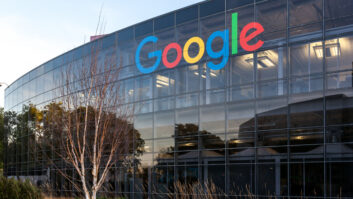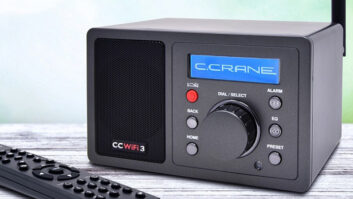OTTAWA, Ontario — 2018 should be a good year for web-connected, speech-controlled “smart speakers,” while podcasts will continue to gain ground. But the bloom may be off the rose for music-only streaming services, due to market saturation and listening alternatives.

That’s what the European experts interviewed for Radionet’s 2018 streaming media look-ahead had to tell us. They were: James Cridland, publisher of podnews.net (a daily news site about podcasting and on-demand content); Nick Fisher, co-founder of Hook Research (a media/strategy consultancy that works with media players globally, including the BBC); Sam Harris, Insights and Engagement manager at Hook Research; and Michael Hill, managing director of the nonprofit Radioplayer streaming platform used by many broadcasters in the United Kingdom, including the BBC.
SMART SPEAKERS
With their ability to search the web guided only by their users’ spoken instructions, “smart speakers” such as the Amazon Echo (Alexa), Apple HomePod and Google Home make it easy for people to find the streaming audio they prefer online. And now that the 2017 gift-giving season has brought smart speakers into listeners’ homes, our experts are expecting these devices to get a workout during 2018.

“Smart speakers will continue to make the noise in this market, if you’ll pardon the pun,” said James Cridland. “They have the capability to get live radio into new rooms in the house, and are seen by many as a voice-controlled replacement for the tabletop radio,” he said.
“These devices are obviously important, and they offer extra functionality beyond an app on one’s phone,” said Sam Harris. “Moreover, as Amazon, Apple and Google go through multiple iterations of their smart speakers, voice recognition and sound quality will get better.”
Michael Hill believes “Smart speakers are significant, and are a good thing for radio — but only if we can stay in control of the interface, and avoid ‘over-the-top’ monetization.” Hill also points out that there are “significant user experience challenges to overcome.”
As well, smart speakers have yet to gain the same status as tabletop radios, which are still “must-have devices” in many listener homes. “As a result, smart speakers are, currently a ‘useful’ rather than ‘essential’ interface in the household,” Nick Fisher said. Worth watching for: “As penetration grows further, expect there to be a bun-fight about which smart speaker manufacturers ‘own’ certain words; and therefore come on top of smart speaker searches online,” he said.
PODCAST AUTHENTICITY
All four experts interviewed for this article agreed that podcasts will likely continue to grow in popularity in 2018. There is so much public interest in these story-driven audio recordings (either streamed by listeners or downloaded on-demand), that “podcasting companies have attracted investment, and are increasingly making mainstream media,” explained Cridland.

For all their idiosyncratic variety, successful podcasts have one thing in common: authenticity. The audio content provided by podcasts — many of which are produced by individuals making them for love rather than money — strikes a chord with listeners seeking “real” stories in a mass-produced mainstream world.
“Podcasts are places where passionate individuals can deep-dive into topic areas that might have been considered too niche by traditional media outlets,” said Fisher. “We have recently completed some research into young, professional men around the U.K., and podcasts came up repeatedly as the content that best ‘gets’ their modern lifestyles; from the rapid-fire banter they have in their own friendship groups, to offering an exploration of the alternative topics (in terms of gender stereotypes) that they are becoming more interested in,” he said.
“Podcasting has a lot more room to grow,” agreed Hill. But rather than realizing its full streaming potential in mass-market terms, podcasting “will continue to dribble upward organically unless its structural issues are addressed.” Specifically, “It is still too difficult for listeners to discover new content, and iTunes has a stranglehold on distribution but aren’t investing in growing the market,” he said.

Some podcasters are trying to cash in by striking win-win deals with advertisers, such as the gay-centric podcast Food 4 Thot being sponsored by the gay/bisexual male “hook-up” app Grindr. In exchange for Food 4 Thot being promoted to Grindr’s 3 million-person user base, “the Grindr brand gets to soak up that sweet, sweet authenticity,” said Harris.
“What we’re most fascinated by, however, is the podcast ad space and how authenticity is working here,” Harris added. “Of course, the host-read ad format lends a lot to the intimacy and strengthens the connection between listener and the ad itself … Crooked Media, in particular, are becoming renowned for their ad breaks, which stand out because of the hosts’ freedom to play with and comment upon the ad copy.”
Whether or nor renting out authenticity to sponsors appeals to listeners remains to be seen “Do podcasts lose a bit of their authenticity from this association?” asked Fisher. “Well, branded podcasts do not regularly come up in our discussions with young people about the medium, so they might not be landing as well as hoped.”
MUSIC STREAMING SERVICES
In previous years, music streaming services such as Pandora and Spotify were the Next Big Thing of internet audio. But although they remain popular, some services may be losing steam.
For instance, “Pandora’s a parochial U.S.-only irrelevance,” said Cridland. “It had first-mover advantage: It’s now a me-too service in a sea of algorithmic jukeboxes. It’s had its day.”

In contrast, “Spotify, Google Play, and Apple Music have done a good job of mopping up the music subscription market,” he continued. As a result, “The number of other entrants in this market has slowed. It’s also encouraged audio producers to stop making online music radio and focus on more interesting content, which is a good thing for listeners.”
“In the U.K. and Europe, music streaming services are basically replacing ‘owned music,’” said Hill. But “they aren’t yet eating into radio listening.” Speaking of radio listening, “More broadcasters defending themselves from aggressive gatekeepers and aggregators,” he said, “by choosing to collaborate in shared platforms like Radioplayer.”
At the same time, some broadcasters are taking an “If you can’t beat ’em, join ’em’ approach to competing with the variety offered by Pandora and Spotify. For instance, “BBC Radio 1 has been trying to position itself as the Netflix of radio,” said Fisher.
Meanwhile, “I think we’ve definitely seen a move to on-demand consumption in terms of podcasting and music subscriptions,” Cridland said. “There appear to be few ‘pure play’ streamers these days, and more interesting audience propositions like podcasting instead.”
WIDESPREAD STREAMING AUDIO
If there is a central theme to these experts’ observations and forecasts, it is that streaming audio will be a popular, vibrant, and evolving medium in 2018.
Moreover, streaming audio has become so prevalent, that what was once an oddity enjoyed by a handful of computer afficionados is on its way to becoming mainstream and mass-market.
“Over the last decade, there have been massive changes in radio streaming technology, along with greatly improved distribution, and better user experience through services like Radioplayer,” said Hill. “This means that listening on phones, tablets, PCs and smart speakers is now normalized as a radio experience, in the same way as a ‘kitchen radio’ seemed normal 10 years ago. This trend will continue in 2018.”
James Careless reports on the industry for Radio World from Ottawa, Ontario.







